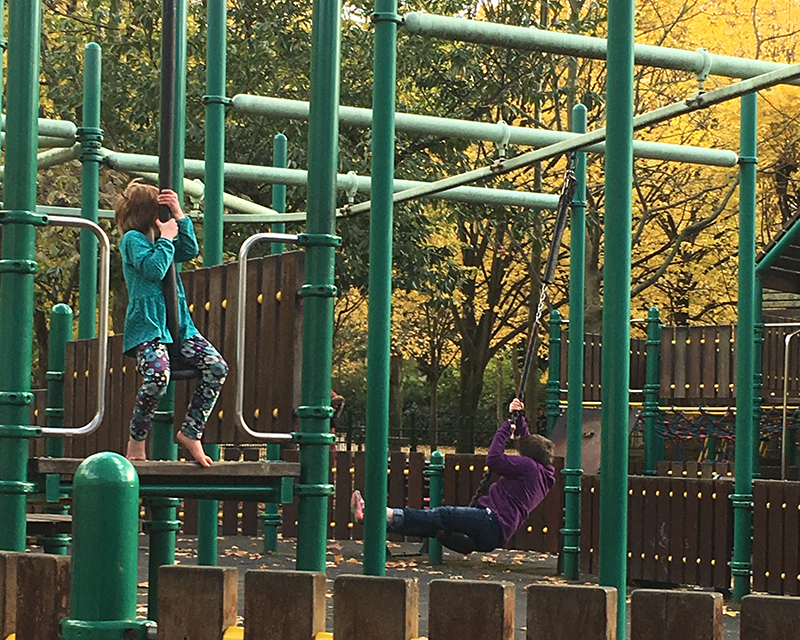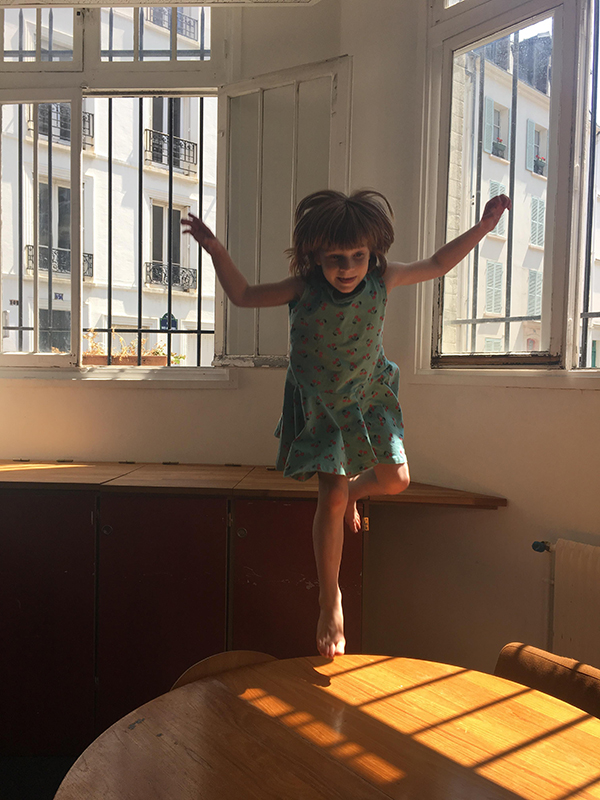This article was first published in the Green Parent magazine, issue no: 85 date: October/November 2018 www.thegreenparent.co.uk.
You’re really moving to Paris? For a school? Can’t you find one you like in the UK? Really?
When we decided that we would move to France so that our children could attend a democratic school in Paris, pretty well everyone we told reacted with incredulity. It seems that in the UK we are more comfortable with the idea of sending a child to boarding school alone than we are with the idea of a family moving across borders. Particularly a school which doesn’t boast amazing facilities, or access to top universities, which doesn’t claim to produce all-round good sports or to have all the children reading Shakespeare by age five. Which, in fact, doesn’t offer any exam preparation, any courses and which promises not to teach the children anything, unless they themselves want to be taught.

So how did we get here? I have two children, who between them have challenged all my assumptions over the last 10 years. We have attempted to parent responsively, putting their needs at the centre of our choices. For us this meant resisting the push to get them into nursery and school as early as possible. I quickly saw that they were highly independent learners, and that they preferred to work things out for themselves rather than be instructed. The process of learning was so much fun when they were interested, and so futile and frustrating when I tried to teach them something which they didn’t find relevant.
Yet at school it is the curriculum which determines what children learn, not the interests of the children themselves. People who had never met my children would decide what they should spend their days learning, and then testing them on how well they had learnt it.
This felt profoundly wrong to me, against everything I knew about child development. The learning process was unfolding so naturally before my eyes, why would I want to interfere with that by introducing lessons and targets, rewards and incentives? The gap between what I felt my children needed as a psychologist and mother, and what schools were doing with the young children in their care was too wide.
So when my son would have started school, aged 4 years 7 weeks, he didn’t go. We home educated instead.
I spent time reflecting on my own experience of education – I attended a wide range of schools whilst growing up, I got used to the changing rules and restrictions. At the Steiner school we were not allowed to watch TV. At the international school we were tested frequently and the names of those who did best were posted around the school on the ‘Honor Roll’. At the girls’ grammar school we were only allowed to wear skirts which were a few inches off the knee. My classmates hardly seemed to notice the absurdity of the chemistry teacher at the front door with a tape measure, sending girls home because of their skirt length, but I had just come from a school with no uniform, where all the girls wore jeans and trainers and no one measured their clothes. Why would the school create a set of arbitrary rules and then waste everyone’s time enforcing them? What did that have to do with education and learning?
The scene was set for me to take a different path with my own children, and so not only did we not send them to school, we also chose not to teach them at home. Their education has been self-directed, which at the start meant that we did not distinguish between play and learning and we did not follow a curriculum. We trusted that they would learn when they were ready. My son learnt to read, without formal lessons. My daughter learnt to swim, without lessons. I learnt to play Minecraft (without lessons). Home education took us in directions I had never imagined.
My reflections on school also led me to considering the positives. Having a community outside my family had been really important to me as a child, and as they grew older I wanted my children to have the same. But none of the schools I found in the UK were what I had in mind. They all had their own priorities which they thought were more important than children’s choices. Some advertised that by Year 4 the children would be learning Latin and two foreign languages, others banned all screens for children under 12, at home and at school. The agendas were different, but no less controlling. Very few of them shared any genuine power with the children.
Through my research I discovered that there are democratic schools where children can choose how they spend their time, where children and adults run the school community together and where children’s choices are respected and valued. This was what I wanted for them, a place where learning and community rather than compliance was the aim.
Schools where the students have genuine power over their environment look quite different to the schools that most of us know. At the school my children now attend – L’Ecole Dynamique – there are no assemblies and no bells. There are no formal classes or classrooms at all. Instead there are rooms dedicated to music, to play, to gaming and to art. There is a common room with a kitchen and a quiet room with books and comfortable chairs. There are people playing hide and seek, children cooking themselves spaghetti, and teenagers playing Go. There are students signing themselves out for a walk round the local park or to go the shop. There are textbooks, reading books, computers, and staff who are ready to discuss ideas – but nothing is compulsory. The school is busy and vibrant, it hums.
Usually people say at this point, but how will they learn to read and do maths? The answer is that they learn it when they need it and when it is meaningful for them, and that when that happens, the process is extraordinarily efficient because they are motivated. My son has learnt to read starting with road signs, moving onto words in games and then to magazines about Minecraft. Now he reads fluently and with enjoyment. No time was wasted trying to persuade him that learning to read is important, or testing his reading ability and assigning him reading books, he chose his own reading materials and reads things which interest him, just as I do. My daughter doesn’t read yet but I have every confidence that she will when she is ready – I’ve seen the process happen for her brother, who didn’t start reading until he was eight.
There are democratic schools all over the world. Germany and the Netherlands have a strong tradition of free schools and in France new democratic schools are opening all the time. The USA has a tradition dating back over 50 years to Sudbury Valley School in Massachusetts. Israel has state-funded democratic schools, some of them with hundreds of students. There are many graduates of these schools who can testify that it works. Yet this hasn’t filtered through to UK educational policy, where our government still seems to believe that more testing, more control and earlier formal teaching is the way to improve learning, despite all the evidence of the damage this does.
Perhaps because of this, we currently have very few democratic schools in the UK. There are several groups trying hard to open new schools – check out East Kent Sudbury, for example – but as yet, the choices for parents are limited.
So limited, in fact, that it was easier for us to move to Paris. So we found an apartment, booked the Eurostar, took a deep breath, and came to France.

The first day was nerve wracking. They had never attended school before, and it was in a new country with a new language. I was immediately struck by how respectfully the staff welcomed them, and how it was clear that they were the focus, not me. That afternoon my children bounced out of school, my daughter telling me she had played all day and my son saying he had made a friend who liked Minecraft. Over time, their confidence has grown. My son tells me that he has been serving as part of the judicial committee (the system by which rule-breaking is managed by the school) and he can see that his contribution is valued. My daughter is getting the opportunity to play with other children all day, even though she is seven now and in the UK would be entering Year 3. She spends her days out at the park, pretending to be a unicorn, then back at school somersaulting on mattresses. The first thing she showed me that she had learnt at school was how to make her way around the meeting room without touching the floor by climbing on mantelpieces and sofas. She waves me away when I arrive to pick her up, telling me she’s not ready to leave yet. I see how the staff at the school relate to the children, as people worthy of respect and who have voices which need to be heard.
It’s been valuable for me, to see that there are schools where it is possible to treat children as people, where all learning is valued and that this isn’t just a utopian ideal. There is no assessment at their school, no testing or monitoring. No goals are set, no learning objectives identified. And yet the children learn, are clearly learning all the time. Their minds are alive with curiosity and questions, and in their heads there is no distinction between school learning and things that interest them, because the things they do at school are exactly what interests them.
So when people tell me, as they still do, that I am ‘brave’ or ‘gutsy’ for taking this decision, I tell them that when I see my children, bursting with ideas and creativity from when they wake to the moment they finally fall asleep, I know that we are doing the right thing. As with when they were little, when we listen they lead the way, our role is to be courageous enough to follow.

One Comment on “School with no lessons”